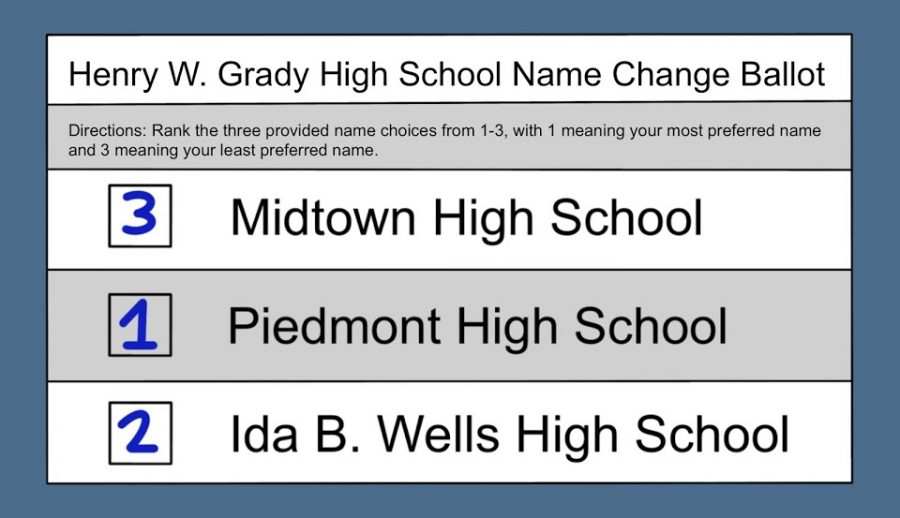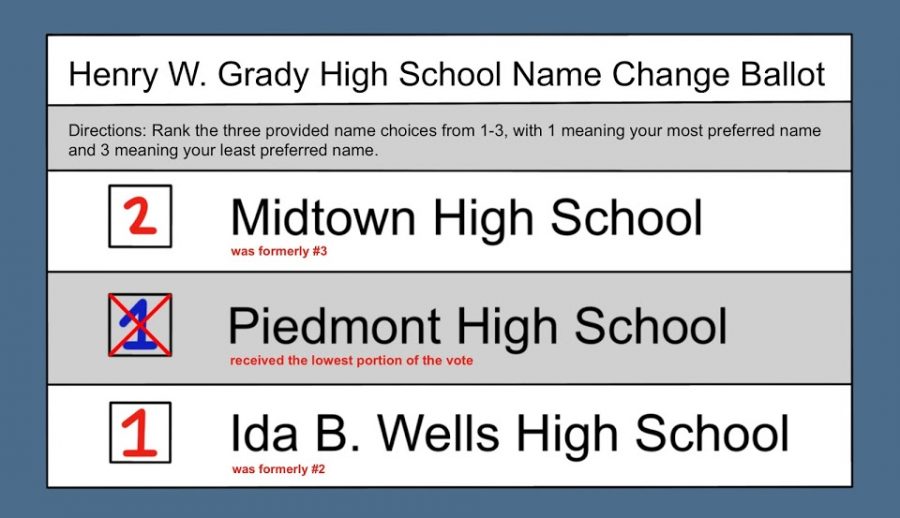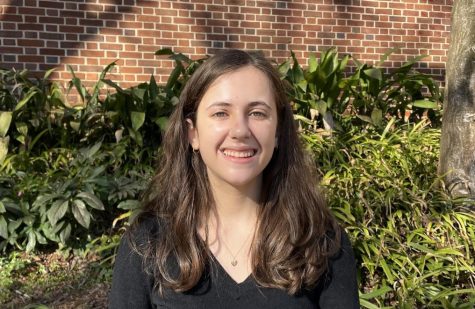Ranked-choice provides poor alternative to traditional voting
Grady’s renaming process asks students to use method to rank finalist names, Ida B. Wells, Midtown and Piedmont
November 19, 2020
Ranked-choice voting (RCV), also called preferential, alternative, or instant-runoff voting, has recently come to the forefront of American political discussions. 2020 marked the first presidential election where a state, Maine, used a RCV system to vote for president. Many tout RCV as a solution to unfair political representation and left or right-wing extremism and hostility. However, unless implemented on a local scale, RCV is too complicated for marginal benefits to be worth the tradeoffs.
In a RCV system, voters rank their candidates from who they’d most like to fill the office to whom they’d least like. If no candidate obtains a majority (more than 50 percent) of the votes cast, the candidate with the least percent of the vote is eliminated from the ballot and the voters who put the least popular candidate first have their votes move to their second choice. This process is repeated until a candidate has a majority.
Take the example of the student vote to rename Grady High School, which will be done by ranked voting.

Suppose you were a student voting on Grady High School’s new name with the three choices of Midtown, Ida B. Wells, and Piedmont. You rank Piedmont first, Ida B. Wells second, and Midtown third. However, Piedmont ends up not getting a majority of the vote. In a RCV system, your vote automatically switches to your second choice, Ida B. Wells.

If Ida B. Wells then gets a majority of the vote, it wins and becomes the new name of Grady High School.
RCV advocates, such as the organization FairVote, suggest that RCV may work to make campaigning less divisive, lessen political polarization and make our representatives more representative. A study found that ranked-choice/alternative voting systems reward “different styles of campaigning… that come more easily to women and women of color,” who are currently under-represented in Congress.
In the 2020 elections, five cities, including Boulder, Colorado and Bloomington, Minnesota, voted to implement RCV in mayoral elections. But voters tend to reject RCV systems once it gets to the state level, as occurred in Massachusetts.
In cities, RCV might be effective, bringing diversity and harmony to a smaller area where it’s not as logistically challenging to implement the system or retabulate ballots, as it is in states. But on a larger scale, America doesn’t need something else to slow down our democratic process.
The reason RCV is failing with state-level voters is that it’s often confusing and complicated for voters to fill out their ballots, and it takes a lot of time to count ballots if a majority isn’t reached. If in the 2020 election, Senator Susan Collins hadn’t obtained a majority in Maine’s ranked-choice voting system, CNN suggests that it would have taken from a week-and-a-half to two weeks to retabulate the ballots.
As of this article’s publication date, ballots are still being counted or recounted for an election that happened 16 days ago. RCV would only prolong the process if implemented state- or country-wide, and as we’ve seen in the aftermath of the 2020 election, prolonged ballot counting times endanger democracy. In the time it took for media outlets to declare former Vice President Joseph Biden President-Elect, current President Donald Trump has suggested widespread voter fraud was occurring (where none has been found) and insisted that he won the election (when he didn’t). Trump used the time race results took to solidify to undermine the democratic process. If RCV was implemented state- or country-wide, there would be more time for damaging claims to be made and the foundation of our country, based on the will of the people, might start to crumble.
The American people don’t need another barrier to voting. RCV’s benefits might be effective on a smaller scale, such as the current student vote for Grady High School’s new name, but RCV implementations for state- or country-wide elections will do more harm than good.







Chris Jerdonek • Nov 19, 2020 at 10:05 am
I have a couple clarifications to add to this piece. The reason it takes Maine longer to count ballots with RCV is the voting equipment they use. Maine uses equipment from a company called ES&S. However, Georgia uses equipment from a company called Dominion. With Dominion equipment, counting ballots with RCV takes the same amount of time as without because the ballots are scanned once and that information is stored. This is why jurisdictions that use Dominion equipment are able to start releasing complete RCV tallies on election night. As more ballots come in, the RCV tallies can be re-run with no additional time required.
Something else worth mentioning is that RCV would make runoffs unnecessary at the state level in Georgia because the majority outcome can be determined in the November election. That would actually cause a lot of time to be saved in the case of the statewide US Senate races. Without RCV, the election process is prolonged much longer because the whole election process needs to be conducted a second time to get a majority outcome, adding several more weeks to the process.